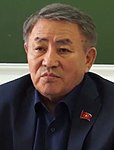| |||||||||||||||||
| Turnout | 95.21% ( | ||||||||||||||||
|---|---|---|---|---|---|---|---|---|---|---|---|---|---|---|---|---|---|
| |||||||||||||||||
| |||||||||||||||||
 |
|---|
|
|
|
Snap presidential elections were held in Kazakhstan on 26 April 2015 to elect the President of Kazakhstan. This was the fifth presidential election held and second without having any formal opposition candidates. With the highest-ever nationwide turnout of 95.2%, the result was a victory for long-term incumbent President Nursultan Nazarbayev of Nur Otan who received 97.8% of the vote, the largest since 1991, thus winning a fifth term in office while his closest challenger, Turgyn Syzdyqov, received only 1.6% of the votes.[1]
Having been originally scheduled for 2016, the election was held a year earlier after numerous calls and support from the Assembly of People of Kazakhstan, the Parliament, as well as political parties for President Nursultan Nazarbayev to support a snap election in order to properly continue the country's development and to avoid for Mazhilis elections to be held simultaneously which were also set for the following year.[2] After the Constitutional Council ruling on 25 February 2015, which stated that the president has the authority to call for snap elections, Nazarbayev that same day signed a decree setting the election date for 26 April.
Nominations of candidates began following the established election day. Of all registered political parties, only two took a decision to participate in the elections by nominating candidates of which were incumbent president Nursultan Nazarbayev from the Nur Otan, and Turgyn Syzdyqov from the Communist People's Party of Kazakhstan while the rest of pro-government parties all endorsed Nazarbayev except for the opposition Nationwide Social Democratic Party. Numerous self-nominees announced their presidential bids in which most of them later withdrew or rejected by the Central Election Commission except for Äbilgazy Qusaiynov, the incumbent chairman of the Federation of Trade Unions of Kazakhstan, leaving the race to be contested by just three candidates, the least of all Kazakhstan's elections.
Campaigning took place in midst of an economic crisis following the 2010s oil glut and the devaluation of the Russian ruble, which severely impacted the Kazakh economy as the solution to the issues during the elections regarding the country's economy were raised, along with the continued Nazarbayev's reforms, social, environmental and industrial safety problems. Despite different proposals and idea from candidates, most of the platforms made by Nazarbayev were the most visible and known to the public.[3]
On 29 April 2015, President Nazarbayev was inaugurated at the Palace of Independence in Astana after winning re-election bid, to which the Organization for Security and Co-operation in Europe reported "serious procedural deficiencies and irregularities" and that voters were offered limited choices.[4] From there, Nazarbayev pledged to implement his proposed five institutional reforms.[5] He continued serving his fifth and final term before eventually resigning in 2019.
- ^ Kazakh leader gains crushing election victory BBC News, 27 April 2015
- ^ "Н.Назарбаев назначил внеочередные выборы Президента РК на 26 апреля 2015 года" (in Russian). BNews. 25 February 2015. Archived from the original on 9 July 2015. Retrieved 28 February 2015.
- ^ "INTERIM REPORT 26 March – 14 April 2015" (PDF). Organization for Security and Co-operation in Europe. 2015-04-16. Retrieved 2021-04-26.
- ^ "REPUBLIC OF KAZAKHSTAN EARLY PRESIDENTIAL ELECTION 26 April 2015" (PDF). Organization for Security and Co-operation in Europe. 2015-07-29. Retrieved 2021-04-26.
- ^ Orazgaliyeva, Malika (2015-04-30). "Re-elected President Inaugurated, Announces Five Reform Efforts". The Astana Times. Retrieved 2021-04-26.

